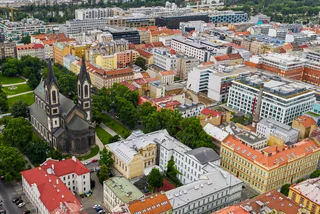The Czech Republic has experienced an economic contraction according to preliminary third-quarter GDP data from the Czech Statistical Office. After pulling out of a brief recession earlier this year, rising costs and weakening global trade have weighed on growth.
The Czech Republic faces a mild recession in 2023 – a departure from earlier balanced forecasts – due to a mix of reasons that include falling foreign demand and household consumption, as well as weakening exports.
PARTNER ARTICLE
Economy worsening every quarter
In terms of growth, Czechia's GDP is currently in a bad state. In July-September this year, GDP fell by 0.6 percent year on year. In the preceding quarter, this figure was the same, and in January-March GDP fell by 0.2 percent.
Household spending declining sharply
Household consumption, a major driver of the economy, has dropped significantly. High inflation has eroded real wages, reducing consumer purchasing power despite income increases. Businesses also report declining orders from both domestic and foreign customers as demand cools worldwide.
Experts also suggest that other factors, such as household spending abroad or the shift towards the informal or "gray" economy, might have contributed to this trend.
Not enough exports
As an export-reliant country, the Czech Republic is feeling the effects of slowing growth abroad, particularly with regards to major trading partner Germany. With investments and exports lagging behind peers, it is more vulnerable to an economic downturn overseas.
Experts say that the vulnerability of the domestic economy to the energy crisis and supply chain disruptions is among the highest in the EU due to Czechia’s high energy-intensive production and the strong focus on the industrial sector.
Manufacturing and production struggling
Manufacturing, a large component of the economy, faces challenges as well. Supply disruptions and high energy costs have impacted production. Declines in added value came from industries like manufacturing, trade, and transport.
Inflation
Additionally, still high inflation – at 6.9 percent in September, higher than in Germany, Poland, France, and Italy – in Czechia has worsened the country’s economy.
As of September 2023, Czechia has the fourth-highest inflation rate in the whole EU. The Czech National Bank also predicts that Czechia will have higher inflation in 2024 (3.4 percent) than the EU average (3.2 percent).
Grim reading today, but what does the future hold?
Despite the challenges, there is hope for improvement in 2024, contingent on factors like year-on-year wage increases and modestly faster European economic growth, as seen in the EU's 0.1 percent growth in the third quarter of this year.
WHAT DO THE EXPERTS SAY?
- Chief economist of the Czech Banking Association Jakub Siedler: Speaking to E15.cz, he believes that Czechia's poor economy is primarily a result of employee wage growth not keeping pace with the average inflation rate in the domestic economy.
- Investor and founder of property firm Hamaga Michal Šnobr: He blames the abolition of Czechia’s super-gross wage as being among the reasons for Czechia’s poor economy.
- Director of the Economic Policy Section of the Union of Industry and Transport Bohuslav Čížek: He calls for pro-growth measures to boost the Czech economy, including improving the business environment, simplifying work permits, and providing more tax breaks for research and development. Čížek stressed the need to increase investment in coming years given recent economic trends.












 Reading time: 2 minutes
Reading time: 2 minutes 



























